$114M Nursing Diploma Scandal: How Thousands of Nurses Got Licensed with Fake Degrees
The recent nursing diploma scandal has exposed a dark underbelly of the healthcare industry—untrained individuals posing as registered nurses and licensed practical nurses due to the proliferation of fake degrees and fraudulent credentials. This alarming situation demands immediate action from employers in the healthcare sector to implement robust verification processes and safeguard the well-being of patients.
Exposing the Nursing Diploma Scandal
The nursing diploma scandal sent shockwaves through the healthcare industry, exposing the disturbing ease with which untrained individuals obtained fake diplomas and transcripts. These fraudulent documents were sold by three now-defunct Southern Florida nursing schools, providing unqualified candidates with a pathway to take national nursing board exams. The scandal’s repercussions were far-reaching, as an estimated 2,800 fake nurses managed to pass these exams, securing positions in healthcare facilities across the United States.
The scandal revealed a blatant disregard for patient safety and raised serious questions about the effectiveness of verification processes in the healthcare sector. The lack of proper training and qualifications of these fake nurses posed significant risks to the well-being of patients, leaving them vulnerable to substandard care and potential harm. Healthcare institutions were left grappling with the fallout of having unknowingly employed unqualified staff, damaging their reputations and eroding public trust.
The Alarming Consequences
The consequences of fake nurses infiltrating healthcare settings were dire and far-reaching. The Department of Veterans Affairs (VA), a critical healthcare provider for veterans, had to take immediate action to remove 89 phony-degreed nurses from direct patient care as a result of the scandal. While the VA stated that no actual patient harm had been reported, the fact that these untrained individuals were providing care to vulnerable veterans highlighted the urgency for more rigorous verification processes.
Beyond the VA, fake nurses were discovered working in nursing homes, assisted living facilities, and agencies responsible for caring for homebound pediatric patients. This widespread distribution of unqualified healthcare professionals underscored the need for healthcare employers to exercise utmost caution when hiring and verifying the credentials of potential nursing staff.
The scandal’s impact extended beyond the immediate safety concerns to the overall credibility of healthcare institutions. Patients and their families were left questioning the authenticity of the care they received, and the tarnished reputation of healthcare facilities cast doubt on the entire industry’s integrity.
Importance of Background Screening within the Nursing Scandal Context
Background screening is an essential process within the nursing context as it plays a pivotal role in safeguarding patient safety. The nursing diploma scandal exposed the potential dangers of unqualified individuals practicing as nurses. By conducting thorough background checks on prospective nursing hires, healthcare institutions can ensure that only qualified and competent professionals are entrusted with patient care. Screening for fake degrees and fraudulent credentials can prevent untrained nurses from slipping through the cracks and protect patients from receiving substandard care.
Upholding Professional Standards
Background screening is a critical aspect of upholding professional standards within the nursing profession. By verifying the authenticity of educational qualifications and licensure, healthcare employers can maintain the integrity of the nursing workforce. The scandal revealed the dire consequences of failing to screen candidates adequately, as fake nurses undermined the credibility of healthcare institutions and the nursing profession as a whole. Implementing rigorous background screening processes helps ensure that only qualified and reputable individuals become part of the nursing workforce.
Mitigating Legal and Financial Risks
The nursing diploma scandal exposed healthcare institutions to significant legal and financial risks. Employing unqualified nurses can result in malpractice lawsuits and other legal complications, leading to substantial financial losses. By conducting comprehensive background checks, healthcare employers can mitigate these risks and avoid potential legal liabilities. Ensuring that all nursing staff possess genuine and valid credentials reduces the likelihood of facing legal challenges related to patient care provided by unqualified personnel.
Strengthening Institutional Reputation
The reputation of healthcare institutions is built on the quality of care they provide. Hiring unqualified nurses damages the reputation and trustworthiness of these organizations. Background screening serves as a proactive measure to protect the reputation of healthcare institutions by ensuring that all nursing staff are highly qualified and legitimate. Upholding a robust reputation is crucial for attracting patients and retaining the community’s confidence in the institution’s ability to provide safe and reliable healthcare services.
Enhancing Public Trust
Public trust in healthcare institutions is essential for fostering a positive patient-provider relationship. The nursing diploma scandal shook public confidence, leading to skepticism and doubt among patients and their families. Healthcare organizations demonstrate their commitment to patient safety and professionalism by implementing rigorous background screening. Transparent and diligent verification processes enhance public trust in the healthcare system and reassure patients that their care is in capable hands.
Preventing Recurrence of Scandals
Background screening is a key preventative measure to avoid the recurrence of nursing diploma scandals and similar incidents in the future. Healthcare institutions can create a more resilient and secure environment by learning from past mistakes and strengthening hiring practices. The scandal serves as a wake-up call for healthcare employers to prioritize background screening, implement robust verification processes, and collaborate with regulatory bodies to effectively identify and address diploma mills.
CRI™ – Empowering Safe and Trustworthy Work Environments
CRI™ provides a comprehensive pre-employment screening service, EmploySmart™, designed to empower healthcare employers with the tools to create safe and trustworthy work environments. With certification for BS7858 and tailored screening packages, CRI Group™ offers a leading worldwide solution for local and international employee background checks, including pre-employment background checks.
Ensuring Patient Safety Through Thorough Investigation
In the context of recent nursing scandals, CRI™’s background checks go beyond basic in-house verifications. Our extensive screening process investigates a person’s character inside and outside their professional lives. With a focus on identity verification, previous employment history, education and credentials, and local language media checks, CRI™ leaves no stone unturned to ensure that only qualified and credible candidates join your healthcare workforce.
Eliminating the Risk of Fraudulent Credentials
The nursing scandal highlighted the dangers of unqualified individuals using fake diplomas and transcripts. With EmploySmart™, CRI Group™ includes thorough education and credential verification to ensure candidates’ provided documents are legitimate and not forged or photoshopped. This critical check helps healthcare employers avoid negligent hiring liabilities and protects patients from potential harm caused by unqualified staff.
Compliant Screening for Peace of Mind
Navigating background check laws can be challenging, especially in the healthcare sector. CRI™’s employment screening services are designed to comply with relevant regulations, ensuring a seamless and hassle-free process for healthcare organizations. With CRI™ as your partner, you can rest assured that you are adhering to necessary legal requirements during the background check process, mitigating legal and financial risks.
Rebuilding Patient Trust and Institutional Reputation
Rebuilding patient trust is paramount after any scandal. By investing in CRI™’s sufficient employment screening services, healthcare employers can enhance their institutional reputation and foster a positive patient-provider relationship. Our integrity due diligence and compliance checks showcase your commitment to patient safety and professionalism, reassuring patients that they are receiving care from qualified and trustworthy professionals.
CRI™’s EmploySmart™ service empowers healthcare employers to create safe and trustworthy work environments through comprehensive employee background checks. By delving deep into candidates’ qualifications, employment history, identity, and compliance with regulations, CRI™ ensures that only qualified and credible professionals become part of the nursing workforce. With CRI™ as your partner in employee background checks, you can safeguard patient care, uphold professional standards, and protect your brand’s reputation, ultimately fostering a work environment where safety, integrity, and patient well-being are at the forefront.
PBSA Annual Conference 2023
Celebrating 20 Years of PBSA: A Spectacular Event in Grapevine, TX
The Professional Background Screening Association (PBSA) is gearing up to celebrate its momentous 20-year anniversary at the 2023 PBSA Annual Conference in Grapevine, TX. This event promises to be a memorable occasion, filled with networking opportunities, informative sessions, and, of course, plenty of celebration.
Let’s take a closer look at what attendees can expect during this milestone event.
An Unforgettable Celebration
PBSA’s 2023 Annual Conference will be more than just a typical industry gathering. With two decades of excellence to commemorate, the celebration kicks off on Sunday evening with the Network Reception, where attendees from diverse backgrounds and industries can come together to connect and build relationships. The camaraderie will continue with the grand Opening Ceremony, followed by the highly anticipated Exhibit Hall Opening Showcase, featuring cutting-edge products and services from top industry players.
The 20 Year Opening Gala
One of the highlights of the event will be the 20 Year Opening Gala on Sunday evening. This elegant affair will take place at 8 p.m. and promises to be a night to remember. The gala will feature a dueling piano performance, setting the perfect tone for an evening of festivity and celebration. Attendees are encouraged to dress in black and gold formal attire to add a touch of elegance to the occasion. However, the organizers are welcoming all attendees, whether in tuxedos and long gowns or semi-formal attire, to be a part of this grand celebration.
Conference Days – Informative Sessions
Monday and Tuesday will be filled with a series of informative sessions led by industry experts and thought leaders. Attendees can expect engaging discussions, educational workshops, and insights into the latest trends and advancements in the background screening industry. These conference days will offer an excellent opportunity for attendees to expand their knowledge, gain valuable insights, and contribute to the professional growth of the background screening community.
CRI Group™ at the 2023 PBSA Annual Conference:
CRI Group™ is thrilled to be an integral part of the 20-year celebration and excited to showcase our latest offerings at the conference. Our team of experts will be available at booths 610 & 612 to provide personalized demonstrations of EmploySmart™ and DueDiligence360™, two groundbreaking solutions that have set new industry standards.
-
EmploySmart™ – ENSURING A SAFE WORK ENVIRONMENT FOR ALL
EmploySmart™ is our state-of-the-art background screening platform that leverages advanced technology and artificial intelligence to streamline the screening process. EmploySmart™ is more than just a screening platform; it’s a powerful tool that ensures a seamless experience for candidates and empowers employers to make confident and informed hiring decisions. With EmploySmart™, you can expect faster turnaround times without compromising on accuracy.
Our platform leverages cutting-edge technology to perform various essential checks, including address verification, identity verification, previous employment verification, and education & credential verification.
EMPOWERING GLOBAL SYNERGY:
YOUR TRUSTED SCREENING PARTNER IN THE USA, MIDDLE EAST, EUROPE & ASIA
Going beyond domestic boundaries, EmploySmart™ offers international criminal record checks, enabling you to make informed decisions about candidates with international backgrounds. For organizations seeking to delve deeper into a candidate’s integrity and reputation, our integrity due diligence service provides invaluable information.
-
DueDiligence360™
DueDiligence360™ is a comprehensive due diligence solution that provides a deep and thorough analysis of potential business partners, vendors, and other stakeholders. With our meticulously curated reports and risk assessments, businesses can make critical decisions with a heightened level of confidence and transparency.
Basic DueDiligence360™ Package:
Our Basic DueDiligence360™ investigation covers a wide range of critical checks, including international business verification, personal profiles on individuals, and company profiles on corporate entities. We conduct historical ownership analysis, identify subsidiaries, and uncover connected parties to give you a complete understanding of a subject’s business interests. Our global/national criminality & regulatory records checks, Politically Exposed Person database searches, and global terrorism checks provide essential information on potential risks and associations.
We also conduct thorough digital media research and company background analysis to ensure you have a comprehensive view of a subject’s online presence and reputation. Additionally, our investigation includes industry reputational assessment, FCPA and UK Anti-Bribery & Corruption risk database checks, and money laundering risk database checks, ensuring that you are aware of any potential compliance or regulatory concerns.
Furthermore, we provide financial reports and asset tracing, giving you valuable insights into a subject’s financial history and stability. Our country-specific databases include litigation checks, law enforcement agencies, and capital market regulators, providing you with comprehensive information about a subject’s legal and regulatory standing.
Level I Essential Integrity Due Diligence Package:
Building upon the DueDiligence360™ Package, our Level I Essential Integrity Due Diligence goes deeper into a subject’s corporate structure and affiliations. We verify addresses, telephone numbers, and corporate records, including shareholdings and directorships. Our investigation includes verification of corporate and business affiliations, as well as personal information on key principals associated with the subject entity.
We conduct research on government affiliations, political positions, and relationships with public officials to assess potential reputational issues. Additionally, we research criminal history records, civil litigation, liens, judgments, and bankruptcies to identify any red flags that could impact your association with the subject.
Level II Enhanced Integrity Due Diligence Package:
Our Level II Enhanced Integrity Due Diligence is the most comprehensive investigation, providing an in-depth understanding of a subject’s activities and history. In addition to all the checks included in Level I, we conduct onsite visits to verify addresses and localities, ensuring greater accuracy in our findings. We verify previous employments, projects completed, business and personal references, academic and professional qualifications, and current activities.
Our investigation delves into the background and track record of key principals and shareholders, with a focus on regulatory or reputational issues of concern. We thoroughly examine property records and asset ownership to provide a complete financial picture.
Furthermore, we conduct comprehensive screenings of local and international sanction lists, PEP databases checks, global compliance database searches, OFAC, and other international sanctions and law enforcement institutions. Our research includes profiling the positioning and connections of the subject and its key principals and shareholders, including business relationships, political affiliations, and exposure to international anti-bribery and anti-corruption legislation. We also undertake source interviews to gather local and industry expert insights, ensuring a well-rounded investigation.
Join CRI Group™ at the PBSA Annual Conference and discover how EmploySmart™ and DueDiligence360™ can transform your background screening procedures. Take this opportunity to meet our team of experts, discuss your unique screening requirements, and learn how CRI™ can be your trusted partner in ensuring accurate and compliant background screenings.
Book your meetings at our booths 610 & 612 to secure a personalized session tailored to your needs.
The Rise in Insurance Fraud by Individuals
Insurance fraud is a growing concern worldwide, with individuals resorting to elaborate schemes to deceive insurers and cash in on substantial payouts. Among the many alarming cases that have come to light, one particular incident from 2015 stands as a stark example of the devastating consequences of such deceit. California resident Ali Elmezayen orchestrated a tragic car accident that claimed the lives of his two autistic children and almost drowned his wife.
Unbeknownst to the authorities, this horrifying event was staged as part of an elaborate insurance fraud plot, leading to a $260,000 payout. In a heart-wrenching twist, the ill-gotten funds were used to purchase real estate in Elmezayen’s native Egypt and a boat, leaving behind a trail of deceit and sorrow. This gripping case highlights the urgency in addressing the rise in insurance fraud by individuals and the need for vigilance in safeguarding the integrity of insurance systems.
What Is An Insurance Fraud?
Insurance fraud refers to the intentional deceit carried out against an insurance company or by an insurance agent, with the aim of gaining financial benefits. These illicit acts can be committed by policyholders, applicants, third-party claimants, and even insurance brokers and providers. Some common instances of insurance fraud involve “padding” or exaggerating claims, providing false information on insurance applications, making claims for injuries or damages that never happened, and staging accidents.
Estimates from the Federal Bureau of Investigation (FBI) indicate that insurance fraud costs the United States over $40 billion annually. This staggering figure underscores the severity of the issue and highlights the urgent need to address and combat fraudulent activities within the insurance industry.
Health insurance companies have faced numerous instances of insurance fraud by individuals. Some individuals have submitted false or exaggerated medical claims, forged medical records, or intentionally misrepresented their medical conditions to obtain insurance benefits fraudulently. Such fraudulent activities have cost health insurance companies millions of dollars annually.
Consequences of Insurance Fraud by Individuals for Companies in the USA
Insurance fraud by individuals can have far-reaching consequences for insurance companies in the USA. For example:
Financial Losses
Insurance fraud places a significant financial burden on companies as they end up paying for fraudulent claims that were deceitfully submitted. These losses can add up quickly, impacting the company’s bottom line and overall profitability. The funds that could have been invested in growth or development initiatives now must be diverted to cover fraudulent claims, hampering the company’s financial stability and growth prospects.
Reputational Damage
Insurance fraud cases can severely tarnish a company’s reputation, eroding the trust and confidence of customers, potential investors, and business partners. The negative publicity and association with fraudulent activities can lead to a loss of loyal customers and a damaged brand image. Rebuilding trust after reputational damage can be a challenging and time-consuming process, impacting the company’s ability to attract new customers and retain existing ones.
Legal Consequences
Companies found to be involved in insurance fraud may face serious legal repercussions. They may be subject to hefty fines imposed by regulatory authorities, endure costly legal battles, and even face criminal charges against the individuals responsible. These legal consequences can result in significant financial losses and damage to the company’s reputation.
Increased Insurance Costs
Insurance companies often pass on the costs of insurance fraud to their customers through increased insurance premiums. The rise in premiums affects honest policyholders who must bear the burden of fraudulent activities committed by a few individuals. Higher insurance costs can lead to decreased customer satisfaction and potential customer attrition.
Lower Employee Morale
Insurance fraud cases can create an atmosphere of distrust and suspicion within the company, negatively impacting employee morale. Employees may feel demotivated when they witness fraudulent activities going undetected or not adequately addressed. Lower employee morale can result in reduced productivity, decreased job satisfaction, and an increased likelihood of employee turnover.
Business Shutdown
For smaller or financially vulnerable companies, the cumulative impact of widespread insurance fraud can be devastating. The financial losses and reputational damage may become insurmountable, leading to business closure. Insurance fraud-induced business shutdowns can have severe implications for employees, customers, and other stakeholders.
Regulatory Scrutiny
Companies involved in insurance fraud may face heightened regulatory scrutiny. Regulatory authorities may closely monitor their operations, leading to additional compliance requirements and the diversion of resources toward addressing regulatory concerns. The increased scrutiny can further strain the company’s finances and impede its day-to-day operations.
Decreased Shareholder Value
Insurance fraud can negatively affect a company’s stock value and shareholder confidence. Shareholders may lose faith in the company’s management and decision-making processes, leading to a decrease in the value of their investments. The decline in shareholder value can have a cascading effect on the company’s ability to raise capital and attract new investors.
Opportunity Costs
Dealing with the impact of insurance fraud can divert the company’s attention and resources from other strategic opportunities and initiatives. The focus on investigating fraudulent activities and implementing measures to prevent future fraud may result in missed business opportunities or delayed projects.
Difficulty in Attracting Talent
Companies tainted by insurance fraud may struggle to attract and retain top talent. Potential employees may be hesitant to join an organization with a damaged reputation, fearing the impact on their own professional standing. Difficulty in recruiting skilled and qualified employees can hinder the company’s growth and competitiveness in the market.
CRI Group™: Mitigating Insurance Fraud Risks for Businesses
Insurance fraud by individuals poses significant challenges for businesses, leading to financial losses, reputational damage, and legal repercussions. To combat this pervasive issue, CRI Group™ offers a comprehensive suite of services designed to help businesses avoid insurance fraud and protect their interests.
Fraud Risk Assessment & Fraud Risk Management
CRI Group™ provides businesses with expert Fraud Risk Assessment and Fraud Risk Management services. By conducting thorough assessments, CRI Group™ identifies potential vulnerabilities in a company’s operations and systems that could be exploited by fraudulent individuals. Through this proactive approach, businesses can implement tailored risk management strategies to prevent insurance fraud before it occurs.
CRI™ Corporate Accountability Services
CRI™ Corporate Accountability services help businesses establish robust compliance and accountability mechanisms. By ensuring meticulous records of due diligence actions, risk assessments, and corrective measures, CRI Group™ empowers businesses to demonstrate their commitment to ethical practices and adherence to regulatory requirements. This transparency serves as a strong deterrent to potential fraudsters who may seek to exploit loopholes in a company’s processes.
Insurance Fraud Investigations Services
CRI Group™ offers specialized Insurance Fraud Investigations services to help businesses detect and address suspected fraudulent activities promptly. Highly skilled investigators with extensive experience in insurance fraud matters work diligently to uncover evidence, gather information, and identify potential fraud schemes. Timely and thorough investigations enable businesses to take appropriate actions to prevent further losses and protect their reputation.
Why Choose CRI Group™ for Insurance Fraud Investigations
CRI Group™’s service offerings are designed to empower your organization to combat insurance fraud by individuals effectively. With our comprehensive solutions, you can proactively detect and prevent fraudulent activities, safeguarding your financial health, reputation, and business integrity.
Fraud Risk Assessment & Fraud Risk Management
Our certified fraud examiners conduct a thorough review and assessment of your current fraud risk management program. We objectively evaluate your policies, procedures, controls, reporting functions, responsibilities assignment, and investigative requirements to identify vulnerabilities and susceptibility to fraud within your organization.
Tailored Fraud Prevention Measures
Based on the assessment findings, we work closely with your team to develop and implement customized fraud prevention and investigation measures. Our anti-fraud controls are designed to strengthen your organization’s defenses against potential fraudulent activities, reducing the risk of financial losses and reputational damage.
Effective Detection Methods
CRI Group™ defines detection methods that encompass a comprehensive range of approaches. From internal audits and suspicious transaction reporting to whistle-blower strategies and program enforcement, our solutions empower you to detect and address potential fraud incidents proactively.
Due Diligence and Corporate Accountability
Our due diligence services extend beyond standard commercial or financial analyses. CRI® Group™ specializes in Integrity Due Diligence, which provides reliable and pertinent, but raw, information. We ensure complete independence in our research, relying as little as possible on information provided by the researched subject, thereby reducing risks associated with FCPA and UK Bribery Act compliance.
Informed Business Decisions
CRI Group™ supports your informed decision-making process by offering in-depth research and analysis. Our due diligence services allow you to make confident choices when pursuing takeovers, mergers, or business relations. With a focus on objectivity, our assessments provide valuable insights to minimize risks.
Diverse Range of Investigations
CRI Group™ handles a comprehensive range of investigations related to insurance fraud. Our expert investigators conduct factual claims investigations, background checks, and asset searches. We specialize in medical fraud investigations, workers’ compensation, injury, liability, and property claims.
Thorough and Professional Approach
With a commitment to professionalism and attention to detail, our investigators gather evidence, conduct interviews, and verify claims to uncover the truth behind suspicious activities. Our thorough investigations help you take prompt and effective actions against fraudulent individuals.
Trusted Global Partners
CRI Group™ serves as a trusted partner to businesses and institutions worldwide. Our dedicated team works with energy, insight, and care, ensuring a positive experience for all parties involved, including clients, reference providers, and candidates.
Proven Methodologies and Expertise:
Effective Solutions Based on Experience:
With a focus on integrity, CRI Group™ employs proven methodologies in our investigative and due diligence services. Our experienced team delivers reliable information while maintaining complete independence, ensuring you receive accurate insights to make well-informed decisions.
Mitigating Fraud Risks
We help you implement anti-fraud controls, making it challenging for potential fraudsters to exploit weaknesses within your organization. Our detection methods, such as internal audits, suspicious transaction reporting, and whistle-blower strategies, provide early warnings to prevent fraudulent activities.
Unbiased Fraud Risk Evaluation
Our certified fraud examiners bring objective and independent expertise to auditing your fraud prevention program. Through our unbiased assessments, we provide valuable insights to strengthen your organization’s defenses against fraud.
CRI Group™ stands out as a leading provider of fraud investigations and due diligence services, offering objective expertise, comprehensive assessments, advanced detection methods, and a commitment to integrity. As your trusted partner, we help your organization fortify its fraud prevention program and make informed decisions, reducing risks and ensuring compliance with legal requirements. With our experienced team and proven methodologies, CRI Group™ empowers your business to navigate the complex landscape of fraud risk management successfully.
Employee Background Screening is Taking the Middle East Region by Storm!
The success of any organization lies in its people—the driving force behind innovation, productivity, and growth. Hiring the right individuals who not only possess the required skills but also align with the organization’s values and culture is crucial for long-term success. Moreover, in an era where data privacy and security take center stage, the need for trustworthy and reliable employees has become paramount. That’s why businesses in the Middle East are embracing a powerful trend that is sweeping the region: employee background screening.
In the United Arab Emirates (UAE), background checks have gained significant attention and recognition, backed by the guidelines outlined in the UAE Labour Law. Employers are now held accountable for any negligence in the employee background verification (BGV) process. With the UAE’s diverse workforce consisting of expatriates from various countries and professional backgrounds, the complexity of employee screening is heightened, making it a critical step for businesses operating in the region.
This blog will unravel the explosive trend of employee background screening in the Middle East. Discover how organizations in the region are recognizing the significance of thorough screening processes and leveraging them to build high-performing teams. Learn about the legal framework surrounding background checks in the UAE and the implications of negligence in this crucial aspect of the hiring process.
Why Background Checks in the Middle East Are Needed?
Background checks have become an essential element of the hiring process in the Middle East. The region has witnessed a growing need for comprehensive background screenings, driven by the rise in terrorism, financial fraud, and other criminal activities. As a result, employers in the Middle East are recognizing the importance of thorough vetting to ensure the safety and success of their organizations.
A Diverse Workforce with Unique Challenges
Saudi Arabia, in particular, stands out as a hub for both native and non-native families, attracting a significant number of foreign nationals. According saudi census 2022, foreign nationals accounted for more than 40 percent of Saudi Arabia’s total population of 32.2 million. This diverse workforce presents unique challenges for employers, necessitating meticulous background checks as part of the work visa application process.
Increased Security Concerns
With the rise in terrorism and other crimes in the Middle East, background checks have become a crucial tool for businesses to ensure the safety and security of their employees and operations. By conducting thorough background checks, companies can identify potential risks and mitigate the chances of hiring individuals with questionable backgrounds.
Protection Against Fraud and Misrepresentation
Background checks help businesses verify the authenticity of a candidate’s qualifications, work history, and other relevant information provided in their resumes or job applications. This helps prevent instances of fraud and misrepresentation, ensuring that candidates possess the necessary skills and experience for the job.
Compliance with Legal Requirements
Background checks in the Middle East are not only a best practice but are also mandated by labor laws. Employers are responsible for ensuring the integrity of their workforce and can be held liable for any negligence in the hiring process. Conducting background checks helps businesses fulfill their legal obligations and demonstrate their commitment to hiring qualified and trustworthy employees.
Safeguarding Reputation and Brand Image
Hiring individuals with a history of misconduct or criminal behavior can have severe repercussions on a company’s reputation and brand image. By conducting thorough background checks, businesses can minimize the risk of hiring individuals who may engage in unethical or illegal activities that could tarnish their reputation.
Mitigating Financial and Legal Risks
Hiring the wrong person can result in significant financial and legal consequences for businesses. Employee misconduct, fraud, or other illegal activities can lead to financial losses, litigation, and damage to business relationships. Background checks help mitigate these risks by providing insights into an individual’s background, reducing the likelihood of making costly hiring mistakes.
Who Can Benefit from Background Screening in the Middle East?
Let’s explore the key beneficiaries of background checks in the Middle East:
Employers in All Industries:
Background checks are essential for employers across various industries in the Middle East. Regardless of the sector, employers need to maintain a safe and secure workplace environment, safeguard their assets, and protect their brand reputation. Background checks help employers ensure that potential employees have the necessary qualifications, skills, and experience to perform their roles effectively and meet the organization’s standards.
Companies Hiring Expatriate Workforce:
The Middle East attracts a significant number of expatriate workers from different countries. For employers hiring expatriates, background checks play a crucial role in assessing the credibility and trustworthiness of individuals coming from various regions. Conducting thorough background checks can help identify any potential risks associated with hiring foreign candidates, such as criminal records, financial irregularities, or fraudulent activities.
Government Organizations and Public Sector:
Government entities and public sector organizations in the Middle East have a responsibility to ensure transparency, accountability, and public trust. Background checks are particularly important for positions involving sensitive information, public safety, or handling public funds. By conducting rigorous background screenings, government organizations can mitigate the risk of hiring individuals with a history of misconduct or unethical behavior.
Financial Institutions and Banks:
The financial industry is highly regulated, and compliance with stringent regulations is paramount. Background checks are critical for financial institutions and banks to verify the integrity and reliability of individuals being considered for roles involving financial transactions, access to sensitive customer information, or positions of authority. Screening for financial integrity, including credit checks and verification of previous employment, helps mitigate the risk of fraudulent activities or potential breaches of confidentiality.
Educational Institutions:
Background checks are equally important for educational institutions in the Middle East, as they strive to provide a safe and secure learning environment for students. Conducting thorough background checks on teachers, administrators, and support staff helps ensure that individuals interacting with students have the necessary qualifications, certifications, and ethical standards. It also helps protect against potential risks such as previous criminal offenses or misconduct.
Healthcare and Pharmaceutical Organizations:
In the healthcare and pharmaceutical sectors, where patient safety and well-being are of utmost importance, background checks are critical. Employers in these industries need to ensure that healthcare professionals, including doctors, nurses, and pharmacists, possess the necessary qualifications, licenses, and credentials. Background checks help identify any discrepancies in educational qualifications, regulatory compliance issues, or previous malpractice allegations.
Security and Defense Agencies:
Security and defense agencies play a vital role in safeguarding national interests and public safety. Background checks are essential in recruiting personnel for security and defense agencies to ensure individuals have a clean record, loyalty to the country, and the necessary skills and qualifications. Thorough screenings can help identify potential risks, including links to criminal organizations, terrorist activities, or conflicts of interest.
Why Middle East Businesses Choose CRI™ for Employee Background Checking Services
At CRI™, we understand the critical importance of comprehensive employee background checks in the Middle East. With our certified pre-employment screening service, EmploySmart™, we provide comprehensive background verification solutions tailored to meet the specific requirements of Middle East businesses. Here’s why Middle East businesses choose us for their employee background checking needs:
Extensive Scope of Services:
We provide a comprehensive range of background screening services, covering various aspects of an individual’s background. Our services include address verification, identity verification, previous employment verification, education and credential verification, local language media checks, credit verification, compliance and regulatory checks, civil litigation record checks, bankruptcy record checks, international criminal record checks, integrity due diligence, and more. Our extensive scope ensures that businesses receive a thorough and detailed analysis of a candidate’s background.
Background Vetting Expertise (BS 7858):
Our team has specialized expertise in background vetting, including compliance with BS 7858 standards. We adhere to the highest industry standards to ensure accurate and reliable results. With our experience and knowledge, we can efficiently handle background checks for candidates and employees at all levels, from senior executives to shop-floor employees.
Direct Access to Senior Staff:
As a valued partner, CRI™ ensures that our clients have direct access to senior members of our staff throughout the background checking process. This direct communication allows for seamless collaboration, efficient information exchange, and timely resolution of any queries or concerns that may arise during the screening process. We prioritize client satisfaction and ensure a personalized and responsive approach to meeting their needs.
Trusted Partner with Global Reach:
CRI™ has established itself as a trusted partner to HR and recruiting managers across the world. Our integrity due diligence teams are highly experienced and well-trained, equipped to handle domestic and international screenings. We have a flat organizational structure, ensuring direct access to senior staff members throughout the background checking process. Our multi-lingual teams operate in over 80 countries, enabling us to provide global coverage and insights. Middle East businesses value our expertise, global network, and commitment to maintaining the highest standards.
Customizable Solutions and Quick Turnaround:
We understand that each business has unique concerns and risk areas. Our solutions are easily customizable and flexible to address specific requirements. Whether it’s tailoring the scope of the background check or accommodating specific timelines, we work closely with businesses to deliver personalized solutions. With our efficient processes and dedicated team, we provide quick turnaround times without compromising on the quality and accuracy of the screenings.
Extensive Global Network and Local Knowledge:
CRI™ has a team of over 50 full-time analysts spread across Europe, the Middle East, Asia, North and South America. Our analysts possess in-depth local knowledge and expertise, enabling us to serve the diverse needs of Middle East businesses with a global perspective. We leverage our extensive network and resources to provide reliable and up-to-date information for informed decision-making.
Conclusion:
When it comes to employee background checking services in the Middle East, businesses choose CRI™ for our comprehensive scope of services, industry expertise, global reach, and commitment to quality. Our solutions are tailored to address the specific needs and risk areas of businesses, enabling them to make informed hiring decisions, mitigate risks, and protect their interests. By partnering with CRI™, Middle East businesses can benefit from reliable and accurate background checks that ensure the integrity and safety of their workforce.
Secure Your Workforce with EmploySmart™ Employee Background Checks! Ensure Peace of Mind with BS7858 Certified Pre-Employment Screening Services Tailored to Your Company’s Needs. Don’t Gamble on Hiring, Trust CRI™ for Thorough Employee Background Checks. Contact Us Today for a Safer and More Reliable Hiring Process!
The DOJ’s Updated Compliance Guidelines: What Every Business Must Know or Face Serious Consequences!
Compliance is the lifeblood of your business, and the U.S. Department of Justice (DOJ) has just released game-changing guidelines that can make or break your success. Ignorance is no longer an excuse! In this blog post, we will delve into the DOJ’s updated compliance guidelines and shed light on what every business must know to ensure adherence.
We will explore the importance of compliance, highlight key elements of an effective compliance program, and emphasize the potential consequences of non-compliance. By understanding the guidelines and implementing robust compliance measures, businesses can protect themselves, mitigate risks, and demonstrate a commitment to ethical and responsible conduct.
Understanding the DOJ’s Updated Compliance Guidelines
Let’s explore the main themes of the DOJ’s updated compliance guidelines and shed light on crucial areas that businesses need to understand to ensure compliance excellence.
Element 1: Incentivizing Effective Compliance Programs
The DOJ’s guidelines place significant importance on companies maintaining effective compliance programs capable of identifying and mitigating misconduct. Notably, the “Compensation Structures and Consequence Management” section underwent significant changes. The guidelines introduce incentives for compliance and disincentives for compliance failures. Prosecutors will now monitor the effectiveness of compliance programs through tracking data on disciplinary actions and transparent communication. Additionally, a three-year Pilot Program on Compensation Initiatives and Clawbacks was introduced to further incentivize compliance.
Element 2: Resource Commitments and Information Sharing
The DOJ has made commitments to enhance corporate criminal enforcement by allocating additional resources. This includes the addition of 25 new prosecutors and substantial investments in the Bank Integrity Unit and Money Laundering and Asset Recovery Section. Furthermore, joint advisories with the Commerce and Treasury Departments will inform the private sector about enforcement trends and security-related compliance expectations. These efforts reflect the DOJ’s dedication to combating corporate crime and promoting compliance.
Element 3: Dynamic Risk Assessment and Continuous Learning
The DOJ emphasizes the significance of periodic risk assessments and the integration of lessons learned into compliance programs. The guidelines stress the need for continuous review and updating of risk assessments, policies, procedures, and controls. Evaluating the current nature of risk assessments and their responsiveness to new circumstances is a critical aspect of compliance. This ensures that compliance weaknesses and misconduct are effectively addressed and managed.
Element 4: Robust Policies, Procedures, and Employee Access
Strong compliance programs rely on robust codes of conduct, policies, and procedures. The DOJ highlights the importance of evaluating the accessibility of these policies and procedures for employees and relevant third parties. Companies should consider publishing policies in a searchable format to facilitate easy reference. Tracking access to policies allows companies to gauge their effectiveness and identify areas that require additional attention. This promotes widespread understanding and adherence to compliance guidelines.
Element 5: Tailored Training and Effective Communication
Tailored training and targeted communication are vital components of effective compliance programs. The DOJ expects companies to provide training sessions that are shorter and more focused, enabling employees to timely identify and raise compliance-related issues. The guidelines emphasize the importance of creating a process for employees to ask questions arising from the training. Addressing employees who may struggle with compliance knowledge is also crucial. The impact of training on employee behavior and operations should be measured to ensure its effectiveness.
Element 6: Whistleblowing System and Reporting Mechanisms
The DOJ recognizes the importance of a robust internal whistleblowing system and anonymous reporting mechanisms. Companies should ensure the existence of an anonymous reporting mechanism and publicize it to employees and third parties. The guidelines explore the measures taken to test employees’ awareness of the reporting mechanism and their comfort level in using it. Offering specialized reporting channels and user-friendly access fosters transparency and encourages reporting of potential compliance violations.
Element 7: Thorough Investigation and Testing
Thorough investigation of allegations and suspicions of misconduct is paramount. The DOJ expects companies to have well-resourced case management systems and processes that ensure comprehensive investigations. Evaluating the effectiveness of investigation processes, such as data collection, analysis, and the testing of compliance mechanisms, is crucial. Tracking investigation findings for patterns of misconduct and compliance weaknesses is essential for remedial actions and future risk mitigation.
The Implications of Non-Compliance: Legal and Financial Consequences
Understanding and adhering to the updated compliance guidelines issued by the US Department of Justice (DOJ) is crucial for businesses to avoid potential legal and financial ramifications. Failure to comply with these guidelines can lead to severe consequences. Let’s delve into the potential repercussions of non-compliance and examine real-world examples where businesses faced serious consequences due to their failure to comply with DOJ guidelines.
Legal Consequences:
-
Criminal Prosecution:
Non-compliant businesses may face criminal charges and prosecution by the DOJ. This can result in significant fines, penalties, and even imprisonment for individuals involved in the misconduct.
-
Damaged Reputation:
Non-compliance can tarnish a company’s reputation, leading to a loss of customer trust and loyalty. Negative publicity surrounding legal proceedings can have long-lasting effects on a company’s brand image and market position.
-
Regulatory Enforcement Actions:
Regulatory authorities may take enforcement actions against non-compliant businesses, including imposing fines, sanctions, or revoking licenses or permits. These actions can severely impact a company’s operations and profitability.
-
Civil Litigation:
Non-compliance can expose businesses to civil lawsuits from affected parties, such as customers, shareholders, or employees. Lawsuits can result in substantial financial settlements, damage awards, and legal expenses.
Financial Consequences:
-
Monetary Penalties:
Non-compliant businesses may be subject to hefty monetary penalties imposed by regulatory bodies or as a result of legal proceedings. These penalties can amount to millions or even billions of dollars, significantly impacting the financial stability of the organization.
-
Loss of Business Opportunities:
Non-compliance can lead to the loss of lucrative business contracts, partnerships, and opportunities. Other companies may be hesitant to engage with non-compliant entities due to the associated risks and potential damage to their own reputation.
-
Increased Compliance Costs:
Remediation efforts to address non-compliance issues can be financially burdensome. Businesses may need to invest in additional resources, technology, and personnel to strengthen their compliance programs and meet regulatory requirements.
Real-World Examples:
-
Volkswagen (VW) Emissions Scandal:
VW faced severe consequences after it was revealed that they manipulated emissions tests in their vehicles. The company faced billions of dollars in fines, legal settlements, and reputational damage, along with criminal charges against some executives.
-
Wells Fargo Unauthorized Accounts Scandal:
Wells Fargo faced significant legal and financial repercussions for opening millions of unauthorized customer accounts. The company paid substantial fines, faced lawsuits from affected customers, and experienced a decline in its stock value and customer base.
-
Theranos Fraud Case:
Theranos, a healthcare technology company, faced legal action after it was discovered that the company misrepresented its capabilities and the accuracy of its blood testing technology. The founder, Elizabeth Holmes, faced criminal charges, and the company ultimately dissolved, facing financial ruin.
How Businesses Can Avoid Consequences Of Non-Compliance?
When it comes to compliance with the US Department of Justice (DoJ) guidelines, businesses need a trusted partner to help them navigate the complex regulatory landscape and avoid the severe repercussions of non-compliance. CRI Group™ is that partner, offering a comprehensive suite of compliance solutions tailored to address the critical areas identified by the DoJ. Let’s explore how our services can assist businesses in mitigating the consequences of non-compliance:
Due Diligence Services:
We understand the importance of conducting thorough due diligence on potential business partners, vendors, and other third parties. Our due diligence services provide businesses with detailed insights and comprehensive background checks, helping them assess the integrity, reputation, and compliance track record of their counterparts. By identifying potential risks and red flags early on, businesses can make informed decisions and avoid partnerships that may lead to non-compliance issues.
Third-Party Risk Management:
The DoJ has consistently emphasized the importance of robust third-party risk management programs. In high-profile cases, businesses faced severe consequences when their partners engaged in illegal activities. CRI Group’s third-party risk management solutions help businesses evaluate, monitor, and mitigate risks throughout the entire partnership lifecycle. By implementing risk-based due diligence, ongoing monitoring, and clear contractual obligations, businesses can proactively manage compliance risks, detect potential misconduct, and take corrective actions before it’s too late.
Compliance Program Development:
A well-designed compliance program is essential for preventing and detecting non-compliance. The DoJ has highlighted the significance of having effective policies, procedures, and controls in place. CRI Group™ collaborates with businesses to develop and enhance their compliance programs, aligning them with the DoJ guidelines and best practices. Our experienced compliance professionals assess the company’s risk profile, design tailored frameworks, and implement robust compliance management systems. By building a culture of compliance and implementing comprehensive program elements, businesses can minimize the risk of non-compliance and demonstrate a proactive commitment to meeting regulatory expectations.
Compliance Training and Education:
Businesses that neglect to provide adequate compliance training to their employees often face severe consequences for their actions. CRI Group™ offers customized training programs that educate employees, management teams, and third parties on compliance requirements, ethical conduct, and regulatory obligations. Through interactive and engaging training sessions, businesses can foster a compliance-conscious workforce that understands the potential risks, knows how to navigate complex compliance situations, and promptly reports any concerns.
Compliance Auditing and Monitoring:
Regular auditing and monitoring of compliance activities are essential to ensure ongoing adherence to DoJ guidelines. CRI Group™ assists businesses in conducting independent compliance audits to evaluate the effectiveness of their programs, identify gaps or weaknesses, and implement corrective measures. Our monitoring services help businesses stay proactive by continuously assessing compliance performance and providing recommendations for improvement.
Continuous Regulatory Intelligence:
Staying updated on evolving regulatory requirements is crucial to maintain compliance. CRI Group™ provides continuous regulatory intelligence services, keeping businesses informed about changes in laws, regulations, and enforcement trends. By leveraging our expertise and timely insights, businesses can adapt their compliance programs and practices to remain in alignment with the DoJ guidelines and other relevant regulations.
Ending Note
In conclusion, the recent updates and clarifications provided by the US Department of Justice (DoJ) in their compliance program evaluation guidelines highlight the importance of a tailored and evolving approach to compliance. It is crucial for companies to understand and adapt to these policy changes to avoid the severe consequences of non-compliance. By implementing effective compliance programs that align with the key requirements outlined in the guide, businesses can proactively address misconduct and mitigate risks.
To mitigate the potential legal, financial, and reputational repercussions of non-compliance with the DoJ guidelines, we invite you to contact CRI Group™ today. Our experienced team will work closely with you to understand your unique circumstances, develop customized compliance solutions, and ensure that your business remains on the path of compliance excellence. Take the necessary steps to protect your company’s reputation and avoid non-compliance consequences by partnering with CRI Group™. Contact us now for a consultation and let us help you navigate the ever-changing compliance landscape.
EU Shocks Global Supply Chains with Mandatory Human Rights Due Diligence Directive
The European Union has released a groundbreaking directive that will transform global supply chains forever. This directive will require large EU companies and non-European companies conducting significant business in Europe to assess and address their human rights and environmental impacts. The numbers are staggering – 13,000 EU companies and 4,000 non-EU companies will be affected by this monumental regulation.
But why is this directive causing such a seismic shift? The answer lies in the importance of Human Rights Due Diligence (HRDD) for companies. The European Union, as the headquarters of some of the world’s largest corporations, understands the critical role it plays in shaping global business practices. Shockingly, the 2020 Corporate Human Rights Benchmark revealed that 85% of alleged human rights impacts occur in developing countries, despite 78% of the implicated companies being based in OECD countries.
This directive builds upon previous transparency initiatives such as the EU Non-Financial Reporting Directive and the Conflict Minerals Directive. Its aim is to hold companies accountable for their human rights and environmental impacts, ensuring they take proactive measures to prevent, mitigate, and remedy any harm caused.
Non-compliance with this groundbreaking directive will have severe consequences. Companies failing to conduct effective due diligence or implement necessary measures will face administrative penalties and civil liability.
The implications are immense. The EU’s influence on global business practices is unparalleled, with €223.3 billion worth of goods imported into its territory. This directive is set to reshape supply chains, foster responsible business conduct, and protect vulnerable workers and communities worldwide.
What is Human Rights Due Diligence?
Human Rights Due Diligence entails taking deliberate actions to ensure that their operations and choices do not contribute to or benefit from human rights abuses. It is a responsibility that extends to businesses of all sizes and sectors. HRDD requires companies to be conscious of the products they procure, the services they utilize, and whether the rights of the people involved in their production have been safeguarded.
Supply Chain and Human Rights Due Diligence
Did you know that major global players like the United States, the European Union, and Germany are taking decisive steps to ensure that supply chains uphold human rights and environmental standards? It’s a crucial development that companies cannot afford to ignore.
The movement to hold companies accountable for their supply chains is gaining momentum worldwide, emphasizing tracing activities down to raw materials. The rules vary, with some being specific to individual companies based on their registration location, while others extend to goods crossing borders, irrespective of the manufacturer’s origin. Non-compliance human right risks range from minimal enforcement to penalties, civil actions, and even goods detainment.
Let’s delve into some of the notable regulations and proposals.
- First, the United States has implemented the Uyghur Forced Labor Prevention Act (UFLPA) and employs Withhold Release Orders (WROs) to curb imports linked to forced labor.
- Meanwhile, the European Union is working towards enacting the Corporate Sustainability Due Diligence Directive (CSDDD) and a proposed regulation banning products made with forced labor.
- Germany has already implemented the Supply Chain Due Diligence Act (LkSG), which obliges companies to establish and update due diligence procedures to enhance compliance with human rights and environmental standards.
While these jurisdictions are taking the lead, numerous other countries, including the United Kingdom, France, Australia, the Netherlands, Canada, and Norway, are also considering similar measures. The global trend is clear: companies will soon face heightened expectations and obligations regarding human rights and environmental sustainability.
UN Guiding Principles on Business and Human Rights
The Guiding Principles on Business and Human Rights outline the corporate responsibility to respect human rights. These principles provide a global standard of expected conduct for all businesses and apply independently of a state’s obligations. The responsibility to respect human rights requires that businesses avoid infringing on the rights of others and address adverse human rights impacts they are involved in.
Here is a summary of the key principles:
-
Principle of Respect:
Business enterprises should respect human rights and avoid infringing on the rights of others. This responsibility exists regardless of a state’s ability to fulfill its own human rights obligations and goes beyond compliance with national laws.
-
Internationally Recognized Human Rights:
The responsibility to respect human rights includes internationally recognized human rights as expressed in the International Bill of Human Rights and the International Labour Organization’s Declaration on Fundamental Principles and Rights at Work.
-
Avoidance of Adverse Impacts:
Businesses should avoid causing or contributing to adverse human rights impacts and address such impacts when they occur. This includes both impacts from their own activities and impacts linked to their business relationships.
-
Size and Context:
The means through which businesses meet their responsibility to respect human rights may vary based on factors such as size, sector, operational context, and severity of impacts. All businesses, regardless of these factors, have the responsibility to respect human rights.
-
Policy Commitment:
Businesses should have a policy commitment to meet their responsibility to respect human rights. This commitment should be approved at the most senior level, informed by expertise, communicated internally and externally, and reflected in operational policies and procedures.
-
Human Rights Due Diligence:
Businesses should conduct human rights due diligence to identify, prevent, mitigate, and account for their adverse human rights impacts. The complexity of due diligence may vary based on the size of the business and the severity of human rights impacts.
-
Integration and Action:
Findings from human rights impact assessments should be integrated into relevant internal functions and processes, and appropriate actions should be taken to prevent or mitigate impacts. The enterprise should exercise leverage to address impacts it contributes to and seek to increase leverage where necessary.
-
Tracking and Communication:
Businesses should track the effectiveness of their responses to human rights impacts and communicate externally about their actions. Communications should be accessible, provide sufficient information for evaluation, and not pose risks to stakeholders or commercial confidentiality.
-
Remediation:
When businesses identify that they have caused or contributed to adverse impacts, they should provide for or cooperate in their remediation through legitimate processes.
-
Contextual Considerations:
Businesses should comply with applicable laws, respect internationally recognized human rights, and treat the risk of causing or contributing to gross human rights abuses as a legal compliance issue. In complex contexts, businesses should seek external expertise from credible sources and prioritize actions to address the most severe impacts.
These principles aim to guide businesses in fulfilling their responsibility to respect human rights and promote accountability and transparency in their operations.
Choose CRI Group™ ESG Due Diligence Service For Risk Mitigation
With the release of groundbreaking directives and the global movement towards human rights due diligence, the business landscape is experiencing a transformative shift. At CRI Group™ , we understand the challenges and opportunities arising from these changes and are here to help businesses thrive in this evolving context.
As a 30-year experienced service provider, we offer comprehensive human rights due diligence solutions through our ESG due diligence services that assist companies being compliant with the laws and achieving sustainable practices. Here’s how we can support your business in the light of this changing landscape:
Expert Guidance
Our team of experts stays up-to-date with the latest regulations, directives, and guidelines surrounding human rights due diligence. We provide tailored advice and practical strategies to help you navigate the complexities of these frameworks and ensure compliance.
Due Diligence Assessments
We conduct thorough due diligence assessments, evaluating your company’s human rights practices, environmental impacts, and supply chain operations. We identify and assess actual and potential risks, areas for improvement, and opportunities for positive impact, enabling you to make informed decisions and take targeted actions.
Compliance Strategies
We assist you in developing effective compliance strategies that align with international standards and regulatory requirements. Our expertise in interpreting and implementing these frameworks helps you establish robust policies, procedures, and reporting mechanisms that demonstrate your commitment to responsible business practices.
Stakeholder Engagement
Engaging with stakeholders is crucial in the realm of human rights and environmental sustainability. We help you build meaningful relationships with stakeholders, including employees, suppliers, communities, and investors. Through transparent and inclusive communication, we help foster trust, gather valuable insights, and drive positive change.
Training and Capacity Building
We offer customized training programs and capacity-building initiatives to empower your workforce with the knowledge and skills necessary to navigate the evolving landscape of responsible business practices. Our workshops and educational events enhance awareness, encourage ethical decision-making, and foster a culture of sustainability within your company’s operations.
Supply Chain Management
We assist you in implementing robust supply chain management practices that prioritize human rights, environmental sustainability, and ethical sourcing. By mapping and monitoring your supply chain, we help identify potential risks, support supplier engagement, and promote responsible sourcing practices.
Performance Measurement and Reporting
We help you develop comprehensive performance measurement frameworks and reporting systems to track your progress towards sustainability goals. Our expertise in data collection, analysis, and reporting enables you to effectively communicate your efforts, achievements, and areas for improvement to stakeholders and build trust in your commitment to responsible business practices.
Continuous Improvement
We recognize that responsible business practices require ongoing commitment and continuous improvement. Our services provide ongoing support, allowing you to adapt to evolving regulations, incorporate best practices, and continually enhance your sustainability performance.
Our due diligence services equip your business with the tools and knowledge to thrive in this dynamic landscape shaped by the EU directive and global trends. We are dedicated to helping you navigate the complexities of human rights due diligence, embrace sustainability, and positively impact society and the environment.
Partner with us to embrace the opportunities this changing business landscape presents and build a resilient and responsible future for your organization. Together, we can drive meaningful change and contribute to a more sustainable and equitable world.
Drake & Scull International (DSI) Plunges $857.5 Million Due to Employee Background Check Failure
What Businesses Can Learn from This Case?
Employee background checking is an indispensable process for organizations, upholding integrity, ensuring trustworthiness, and validating qualifications. Statistics reveal that background check failures can have severe financial repercussions for companies. In the United States alone, negligent hiring claims have resulted in verdicts ranging from $1 million to over $40 million in certain cases.
This blog delves into the repercussions faced by Drake & Scull International (DSI), a prominent Dubai-based company, due to failures in employee background checking. It underscores the paramount importance of comprehensive screening practices, highlighting the tangible consequences of insufficient vetting procedures.
Background:
Following a management transition, DSI launched an intensive investigation into the actions of its preceding leadership. The probe unearthed a series of criminal complaints lodged against former executives, members of the board of directors, and even certain family members. The company’s new management exhibited an unwavering commitment to safeguarding shareholder rights and vowed to pursue those found culpable for jeopardizing the organization’s best interests.
Hidden Losses and Mismanagement:
The internal investigation brought to light a disconcerting revelation: DSI had been grappling with substantial annual losses concealed from shareholders from 2009 to 2017. These losses mounted from $255.6 million in 2015 to a staggering $380 million by 2017, aggregating to a cumulative sum of $857.5 million. The fact-finding committee attributed these covert losses to the previous management’s lamentable failure to adhere to corporate governance and transparency protocols, compounded by inadequate managerial and financial standards.
Importance of Employee Background Checking:
According to estimates from the U.S. Department of Labor, making a bad hiring decision can come at a steep price, equivalent to a staggering 30% of the potential earnings in the first year. This eye-opening statistic highlights the significant financial impact that businesses can face when they fail to conduct thorough employee background checks. Discover the crucial reasons why employee background checking is vital for businesses’ success and security.
· Safeguarding Shareholder Trust
The case of DSI aptly exemplifies the criticality of upholding shareholder trust. Diligent background checks enable organizations to identify individuals with a history of misconduct or fraudulent activities, preventing them from occupying positions of influence within the company. This bolsters shareholder confidence and preserves the credibility of the enterprise.
· Mitigating Financial Losses
Insufficient background checking can inadvertently lead to the recruitment of individuals lacking the requisite qualifications or possessing a track record of poor financial management. Such employees can significantly contribute to financial losses, as evidenced by DSI’s clandestine financial setbacks, which amounted to three times the organization’s total paid-up capital.
· Preserving Reputation and Rebuilding Trust
An organization’s reputation is its lifeblood—a testament to its values, competence, and reliability. Failure to conduct rigorous background checks can engender scandals, legal entanglements, and irreparable damage to the company’s image. Rebuilding trust and restoring reputation in the aftermath of such incidents demands protracted efforts and resources.
· Compliance with Governance and Transparency Regulations
Meticulous employee background checking ensures compliance with corporate governance and transparency regulations. By verifying that employees meet the requisite standards and exhibit an untainted record, organizations minimize the risk of regulatory non-compliance, safeguarding the interests of all stakeholders.
Mitigating Risks and Safeguarding Your Business: CRI Group™’s EmploySmart™ Background Check Service
CRI Group™ understands the importance of mitigating risks associated with negligent hiring liabilities. That’s why our employee background check service called EmploySmart™ is certified for BS7858, a recognized standard for security screening within the industry. We adhere to rigorous compliance measures to ensure that our background checks align with legal requirements and industry best practices. By partnering with us, businesses can rest assured that their employee screening processes are conducted in a meticulous and lawful manner.
We are also excited to announce our participation and exhibition at the highly anticipated SHRM 2023 Annual Conference, the largest HR solutions event in the world. By attending SHRM 2023, participants can connect with CRI Group™’s experts at their booth, gain insights into the latest industry trends, and explore how EmploySmart™ can enhance their organization’s hiring processes and overall risk mitigation strategies.
EmploySmart™: A Robust Pre-Employment Screening Service
Are you ready to revolutionize your pre-employment screening process? Look no further than EmploySmart™, the certified solution that takes the guesswork out of hiring and helps you mitigate negligent hiring liabilities. With EmploySmart™, organizations can create a safer workplace and bolster their risk management strategies like never before.
Say goodbye to sleepless nights worrying about the potential risks of hiring the wrong candidates. EmploySmart™ is specifically designed to comply with BS7858 standards, ensuring the highest level of screening accuracy and reliability. We leave no stone unturned, conducting comprehensive checks to provide you with a holistic view of your applicants.
Tailored Screening Packages for Every Position
EmploySmart™ provides flexible screening packages tailored to the specific requirements of each position within a company. CRI Group™’s comprehensive screening services cover a wide range of areas, including education and employment history verifications, criminal record checks, reference checks, and much more.
Our expert team will guide you through the screening process, helping you select the right package that aligns with your industry regulations and job requirements. We take pride in our attention to detail, ensuring that every aspect of the screening process is conducted accurately and efficiently.
Ensuring Truth and Validating Credentials
EmploySmart™ helps organizations address the challenge of determining whether the information provided by candidates is accurate and truthful. CRI Group™’s background checks verify educational qualifications, employment history, and other crucial details, ensuring transparency and minimizing the risk of fraudulent claims.
Our expert team meticulously examines each candidate’s educational qualifications, leaving no room for doubt or uncertainty. We delve into their employment history, cross-checking the details to ensure accuracy. With EmploySmart™, you can rest assured that the claims made by candidates are thoroughly vetted, promoting transparency, and reducing the risk of encountering fraudulent credentials.
Compliance with Laws and Regulations
By partnering with CRI Group™ and utilizing EmploySmart™, organizations can confidently navigate the complex landscape of background check regulations. CRI Group™ ensures that its screening processes comply with local and international laws, reducing legal risks and reinforcing due diligence.
Saving Time, Money, and Heartbreak
Investing in comprehensive employment screening services like EmploySmart™ can save organizations valuable time, financial resources, and potential heartbreak. By proactively identifying potential risks and red flags during the hiring process, businesses can avoid costly legal battles, reputational damage, and negative impacts on employee morale.
CRI Group™’s EmploySmart™ background check service serves as a powerful tool for industries to prevent losses, safeguard their business, and ensure a safe work environment for all. Don’t miss the chance to learn more about EmploySmart™ at the SHRM 2023 Annual Conference and discover how CRI Group™ can assist your organization in creating a brighter and more secure future.
Fraud Prevention and Investigations: A Powerful Tool for Mitigating Business Risks
It’s no secret that business risks come in all shapes and sizes, but few of them can have as devastating an effect on the long-term health and success of a business than fraud. Fraud prevention and investigations are invaluable tools for mitigating the inherent threats posed by malicious actors who aim to take advantage of vulnerable systems or unsuspecting individuals in order to filch valuable information, goods or even money.
In this blog post, we dive deep into how fraud prevention and investigations can help businesses from all industries protect their assets, save resources and remain competitive. So if you’re searching for actionable solutions for combating fraudulent behavior within your organization, read on – you won’t be disappointed!
Corporate Fraud and Poor Governance: The Risks and Consequences for Businesses
Corporate fraud and poor governance practices pose significant risks to companies of all sizes. Recent high-profile cases have highlighted the damaging effects of dishonest behavior. Fraudulent activities not only erode profits and operational efficiency but can also severely harm an organization’s reputation.
For instance, the Wells Fargo fake accounts scandal, which erupted in 2016, revealed that the bank had created millions of unauthorized accounts and charged customers for services they never received. The fraudulent activities resulted in billions of dollars in penalties, a tarnished reputation, and the departure of the CEO and other top executives.
Similarly, the Facebook-Cambridge Analytica data scandal, which came to light in 2018, exposed the social media giant’s poor governance practices. The company failed to safeguard the personal data of millions of users, which was then harvested by a political consulting firm without users’ consent. The scandal resulted in public outrage, regulatory investigations, and a significant drop in Facebook’s stock value.
These cases demonstrate the critical importance of strong governance and fraud prevention measures. Companies must proactively identify and mitigate risks associated with fraudulent activities to avoid devastating consequences. By implementing robust governance and fraud prevention frameworks, businesses can protect their reputation, financial health, and long-term sustainability.
How To Establish A Fraud Prevention Framework?
Establishing a fraud prevention framework is critical for businesses of every size and industry. With the rise of digital technology and globalization, companies must be prepared to face a corresponding increase in fraud risks. To prevent fraud from occurring within your organization, you must create a proactive strategy that uses proven techniques to investigate any potential fraudulent activities aggressively. Let’s look into some of the most effective strategies that companies can use to establish a robust fraud prevention framework.
Use Proven Techniques to Investigate the Case Aggressively
One of the most critical steps in establishing a fraud prevention framework is to use proven techniques to investigate any potential fraudulent activities within your organization aggressively. This includes conducting thorough investigations into any suspicious activities, coordinating with law enforcement agencies, and using data analytics tools to detect irregularities. The goal is to identify any fraudulent activities quickly and take swift action to prevent further damage.
Collect Evidence
To effectively investigate any fraudulent activities, it is crucial to collect as much evidence as possible. This includes digital data, transactional records, email correspondence, and physical documents. All of this evidence can be used to determine the facts of the case and build a solid case against the perpetrators. The evidence collected must be admissible in court and must be handled with the utmost care to ensure that it is not tampered with.
Determine the Facts
Once all of the evidence has been collected, it is time to determine the facts of the case. This process involves reviewing all of the evidence, examining financial records, conducting interviews, and analyzing data to piece together what happened. This step is critical, as it will inform the next stages of the investigation and allow your company to take the appropriate actions to mitigate any damage.
Detailed Asset Checks
Asset checks are a vital part of any fraud prevention framework. By conducting detailed asset checks, your company can quickly identify any discrepancies in financial records, identify any hidden assets, and uncover any fraudulent activities within the company. This step is essential to recover any misappropriated funds and prevent further damage to the company’s finances.
Background Verifications
Conducting background verifications is another critical component of establishing a fraud prevention framework. This step involves verifying the credentials of all employees, vendors, and contractors who have access to sensitive information or financial records. It is essential to ensure that everyone involved in the company’s operations is trustworthy and has no history of fraudulent activities.
Modern Surveillance
Modern surveillance technologies, including CCTV cameras, facial recognition tools, and data analytics software, can be valuable tools in detecting and preventing fraudulent activities. These technologies can help you identify and track suspicious activities in real-time, monitor employee behavior, and track inventory movements, among other things. Incorporating modern surveillance methods into your fraud prevention framework can be an effective way to mitigate the risk of fraud within your organization.
Stylized Forms of Investigation and Analysis
Finally, to establish a comprehensive fraud prevention framework, it is essential to incorporate stylized forms of investigation and analysis. These can include forensic accounting, cybercrime investigations, and social engineering assessments. These specialized forms of investigation and analysis can be used to detect and prevent specific types of fraud, such as hacking, insider threats or phishing attacks.
Benefits of Fraud Prevention Framework For Your Businesses
Fraud is a reality for businesses of all sizes, costing them millions every year. The best way to combat fraud is to have a fraud prevention framework in place. A fraud prevention framework is a comprehensive and integrated approach to detecting and preventing fraud at all levels of the organization. Let’s explore the benefits of fraud prevention frameworks for businesses.
Securing Your Business
The primary benefit of a fraud prevention framework is that it helps businesses secure their operations. By implementing an integrated system of internal controls, businesses can minimize the risk of fraud, theft, and embezzlement. A robust fraud prevention framework can help businesses identify potential fraud risks, establish internal controls to prevent fraud, and monitor their effectiveness continuously. By securing their operations, businesses can protect their bottom line and safeguard their reputation in the market.
Increased Efficiency and Productivity
Another major benefit of fraud prevention frameworks is increased efficiency and productivity. When businesses implement fraud prevention systems, they can automate processes to reduce the manual labor associated with fraud detection, investigation, and resolution. This means that employees can focus on their core duties and responsibilities, thereby increasing productivity.
Cost Savings
Moreover, implementing a fraud prevention framework can result in significant cost savings for businesses. By detecting and preventing fraud in its early stages, businesses can save money that they would have lost to fraud-related activities. Additionally, fraud prevention frameworks help businesses avoid costly lawsuits and regulatory fines associated with fraud.
Compliance with Regulations
Businesses must comply with various rules and regulations concerning fraud prevention. A fraud prevention framework enables businesses to comply with legal requirements by establishing internal controls, reporting mechanisms, and due diligence processes. By complying with regulations, businesses can avoid legal problems and maintain a positive business environment.
Improved Reputation
Implementing a fraud prevention framework can help businesses improve their reputation in the market. Fraud is a severe threat to a business’s reputation, and any news of fraud activity can cause significant damage to its brand image. A fraud prevention framework can help protect businesses from reputational damage. Businesses can build trust with their stakeholders and customers by demonstrating a commitment to honesty, transparency, and accountability.
Conclusion
Fraud prevention and investigations are an invaluable tool to protect businesses and the individuals who work within them. Fraud isn’t just a financial issue, it affects all aspects of our lives, from the safety of our property and possessions to the livelihoods we depend on. By investing in fraud prevention, businesses can reduce the threat of crime, safeguarding themselves and their employees from further potential losses. By uniting anti-fraud measures with efficient investigative practices, companies can be rest assured that they are taking all necessary steps to mitigate risk against potential fraud impacts. To ensure success in this endeavour, companies should use independent third-party investigators who specialise in fraud prevention and investigation services to help uncover any untrusted vendors or fraudulent activity.
For firms looking for additional cost-effective protection against fraudulent activities, these advanced services can provide an extra layer of security needed in today’s volatile business climate. We hope this blog post has helped you understand why fraud prevention and investigations are an important tool to mitigate your business risks and how they can help protect stakeholders from falling victim to various types of fraud scenarios. Hopefully it helped!
Reducing Disruptions in Pharma Supply Chain
How Third-Party Risk Management Can Help
The pharmaceutical supply chain is complex, with numerous suppliers and vendors involved in the process of bringing a drug to market. With the rising costs and regulatory challenges, the industry is outsourcing more and more, expanding the supply chain’s risk and complexity.
According to a 2020 Deloitte survey, 84% of companies reported experiencing a third-party incident in the past three years. This makes third-party risk management (TPRM) a critical aspect of ensuring the quality and safety of finished products. In fact, the first half of 2022 saw 337 data breaches affecting over 19 million individuals, highlighting the pressing need for robust third-party risk management strategies.
In this blog, we will explore how third-party risk management can help ensure the continuity of the pharmaceutical supply chain and prevent risks posed by third party vendors.
Importance Of Third-Party Risk Management 3PRM™
The 3PRM™ assessment is designed to help organizations ensure they have the proper policies and procedures in place to address all potential risks related to management, operations, and finance. It stimulates the likelihood of those risks occurring and evaluates key factors like internal auditing procedures, compliance guidelines, performance criteria, internal controls, reporting processes, and contractual requirements. By assessing these factors, organizations can foster a positive long-term relationship with their third-party providers and evaluate the cost-benefit of the relationship. Here’s why pharma companies need a third party risk management system.
Third-party Risks are Increasing
The number of third-party vendors that businesses rely on has been increasing over the years, leading to a higher likelihood of encountering risks. Third-party vendors can include suppliers, contractors, service providers, and more. These vendors may not have the same level of security measures in place as your organization, which could lead to data breaches, cyber-attacks, and other security incidents. Therefore, businesses need to implement a comprehensive third-party risk management (3PRM) program to mitigate these risks.
Regulations Require 3PRM™
Many industries, including healthcare, finance, and government, have regulations in place that require businesses to implement a 3PRM™ program. Non-compliance with these regulations can result in hefty fines and damage to the company’s reputation. Therefore, implementing a 3PRM™ program is not only necessary to comply with regulations but also to protect your business.
Protect Your Reputation and Brand
A single incident involving a third-party vendor can damage a business’s reputation and brand. The public often holds the company responsible for any security incidents involving third-party vendors. Therefore, implementing a 3PRM™ program can help businesses maintain their reputation and brand by ensuring that their vendors are properly vetted and managed.
Financial Impacts of Third-party Risks
Third-party risks can have significant financial impacts on businesses, such as loss of revenue, legal fees, and penalties. A data breach or cyber-attack involving a third-party vendor can result in financial loss and damage to the company’s financial stability. Therefore, implementing a 3PRM™ program can help mitigate these financial risks and protect the company’s bottom line.
Improve Supply Chain Continuity
Third-party vendors are an essential part of a business’s supply chain. If a third-party vendor is unable to deliver products or services, it can result in supply chain disruptions and affect the business’s operations. Therefore, implementing a 3PRM™ program can help improve supply chain continuity by identifying and managing risks associated with third-party vendors.
Cost-Effective Solution
Implementing a 3PRM program can be a cost-effective solution for businesses. The costs associated with managing third-party risks are typically lower than those associated with a security incident involving a third-party vendor. Therefore, investing in a 3PRM™ program can help businesses save money in the long run.
Holistic Approach to Risk Management
A 3PRM™ program takes a holistic approach to risk management by addressing risks associated with third-party vendors comprehensively. The program includes identifying and prioritizing high-risk vendors, conducting due diligence, monitoring and reporting on vendor performance, and more. By taking a holistic approach to risk management, businesses can ensure that they adequately address third-party risks and protect their organization.
Risks Posed by Third Party Vendors in the Pharma Industry
The pharmaceutical industry is heavily reliant on third-party vendors for the supply of raw materials, manufacturing, packaging, and distribution. These vendors can be both national and international, and their inability to deliver can result in severe consequences. The following are some of the challenges that pharmaceutical companies face:
Complex Supply Chains
The pharmaceutical industry is renowned for having one of the world’s most complex supply chains. With multiple linkages, including raw material suppliers, contract manufacturers, and distributors, it can be quite challenging to keep track of all the parties involved. But the greatest challenge lies in mitigating the risks posed by third-party vendors. Any problem that arises along the various links of the chain has the potential to cause far-reaching consequences, not just for pharmaceutical companies but also for patients and healthcare professionals.
Regulatory Compliance
The pharmaceutical industry is no stranger to strict regulations and for good reason. The industry is responsible for producing and distributing drugs that can have a direct impact on people’s health and well-being. Adhering to regulations is not only essential for the sake of legality, but it is also crucial for protecting the public. This is precisely why companies in the industry take regulatory compliance with the utmost seriousness, especially when it comes to their third-party vendors. Non-compliance with vendor regulations can lead to devastating consequences, such as hefty fines or even irreparable damage to the industry’s reputation.
Cybersecurity Risks
As the world continues to move towards digitalization, it is no surprise that the supply chain has followed suit. However, this increasing reliance on technology has also opened up a new avenue of risk for businesses: cyber-attacks. It is now more important than ever to safeguard sensitive information from hackers who can disrupt supply chains and damage operations. Third-party vendors pose a significant risk to businesses, as they often handle critical data and may have less robust cybersecurity measures in place.
Ethical Concerns
Pharmaceutical companies play a critical role in the health and well-being of millions of people around the world. With this important responsibility comes the need to ensure that high ethical standards are maintained, and that environmental and social harm is avoided at all costs. However, this can be easier said than done, as many companies rely heavily on vendors to provide vital services and products. These vendors, while essential to the day-to-day operations of the company, can also pose significant risks if they fail to uphold ethical and environmental standards.
Lack of Control Over Third-Party Vendors
The role of third-party vendors in the pharmaceutical industry is crucial, but it also poses a significant challenge – lack of control. This lack of control means that pharmaceutical companies have a difficult time implementing and enforcing risk management protocols, as they have limited oversight of these vendors. The risk posed by third-party vendors can include anything from data breaches, supply chain disruptions, regulatory violations, or even product recalls. The importance of managing the risk posed by third-party vendors cannot be overstated, as it can have far-reaching consequences for a pharmaceutical company’s reputation, financial performance, and, ultimately, patients’ safety.
Supplier Consolidation
With the consolidation of suppliers, companies are increasingly relying on a smaller pool of vendors to provide the necessary components and ingredients for their products. While this approach has its benefits, such as driving down costs, it also poses significant risks. In particular, the dependence on a limited number of third-party vendors increases the risk of disruptions in the supply chain. Whether due to natural disasters or unforeseen circumstances, any interruption in the availability of key ingredients or components can lead to significant problems for pharmaceutical companies.
Financial Risk
One of the biggest challenges that pharmaceutical companies face is financial risk, most notably when it comes to third-party vendors. These vendors can make or break a company’s success, and when they fail to deliver or when the supply chain is disrupted, it can have serious consequences. From delays in getting products to market to financial losses, the impact of these risks can be significant. It’s important for these companies to have a solid understanding of the risks involved and to have a plan in place to mitigate them.
How To Mitigate Third Party Vendor Risks In Pharma Supply Chain?
As the pharmaceutical industry increasingly relies on third-party vendors for the supply of raw materials, it only takes one incident of a faulty product, delayed shipment, or shortage of critical ingredients to impact a company’s bottom line and reputation.
To help mitigate these risks, CRI Group™ is launching a new third-party compliance verification and certification program, called 3PRM-Certified™.
With this program, pharmaceutical companies across the Middle East, Europe, and Asia regions can establish the legal compliance, financial viability, and integrity levels of outside partners, suppliers, and customers seeking to affiliate with their businesses. By thoroughly vetting potential partners and vendors, companies can better manage third-party risk in their supply chain, ensuring continuity and safeguarding their reputation.
Implementing a strong third-party risk management program that includes 3PRM-Certified™ can help pharmaceutical companies avoid potential supply chain disruptions, regulatory non-compliance, financial loss, and damage to their reputation. By taking proactive measures to assess and manage third-party risks, companies can improve supply chain continuity and ensure the integrity of their operations.
CRI Group’s 3PRM™ Solution: A Comprehensive Approach to Avoid Third-Party Vendor Risks
When it comes to third-party risk management, it’s important to have a comprehensive approach to mitigate potential risks. That’s where CRI Group’s 3PRM™ solution comes in. Our solution streamlines the entire third-party risk management process with scalability and efficiency, from risk identification to assessment.
Here are some ways that our 3PRM™ solution can help your business:
Due Diligence:
We conduct thorough due diligence to verify the legal compliance, financial viability, and integrity levels of potential third-party partners, suppliers, and customers.
Screening & Background Checks:
Our screening and background checks ensure that third-party entities have a clean track record and do not pose any potential risks to your business.
Regulatory Compliance:
We ensure that all third-party entities comply with relevant regulations and laws, including industry-specific regulations and global compliance standards.
Business Intelligence:
Information Management: Our business intelligence services provide critical information and insights about third-party entities, including their reputation, financial status, and potential risks.
Investigations:
Our investigations service includes IP investigations, fraud investigations, conflict of interest investigations, and more, to help you uncover potential risks and protect your business.
Anti-bribery & Anti-Corruption (ABAC) Compliance:
We help businesses comply with anti-bribery and anti-corruption regulations, including the Foreign Corrupt Practices Act (FCPA) and the UK Bribery Act.
Employee Auditing, Training & Education:
We provide employee auditing, training, and education services to ensure that your team is knowledgeable about third-party risks and compliant with relevant regulations.
Monitoring & Reporting:
We offer ongoing monitoring and reporting services to ensure that third-party entities continue to comply with regulations and that their risk level remains acceptable.
By utilizing CRI Group’s 3PRM™ solution, your business can mitigate potential risks from third-party vendors and protect your reputation, financial stability, and compliance. Don’t let third-party vendor risks compromise your pharma supply chain. Contact CRI Group™ today to learn more about our comprehensive 3PRM™ solution and how we can help your organization mitigate risks and ensure compliance.
HR Summit & Job Fair 2023 Exhibition – Islamabad
Corporate Research & Investigations CRI Group™ cordially invites you to attend Pakistan’s HR Summit being held on May 27th, 2023, at Pak-China Friendship Center Islamabad!
We believe Pre-Employment Screening & Background Verification concepts are an inescapable recruitment tool for your organisation if you are looking to minimise risks surrounding a bad hire.
Join our vision to protect your business’s sustainability and welfare against unqualified contenders!



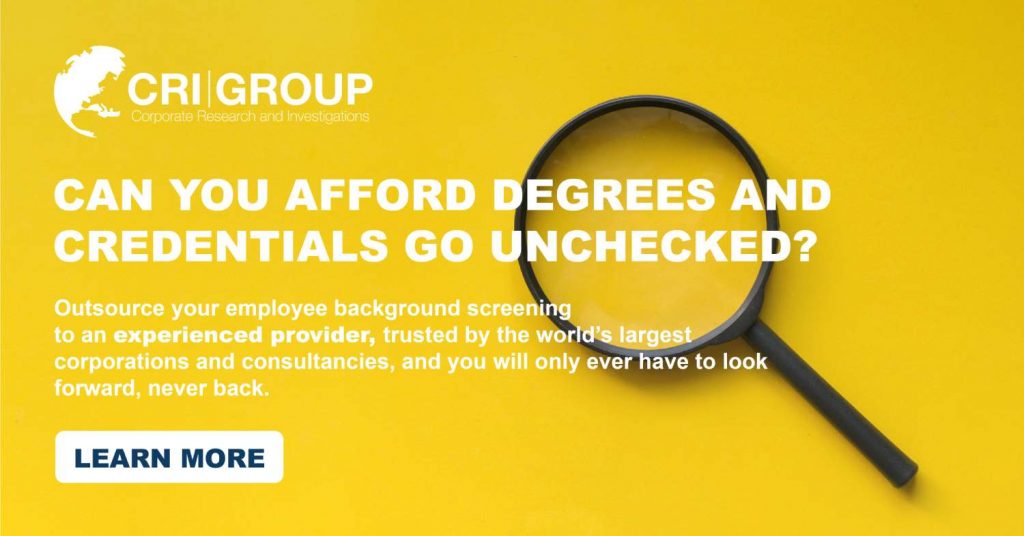

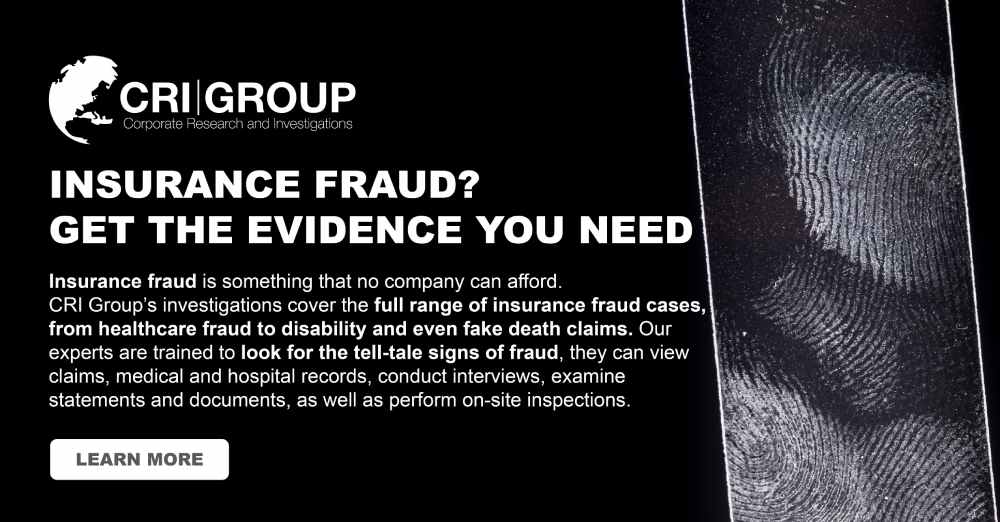

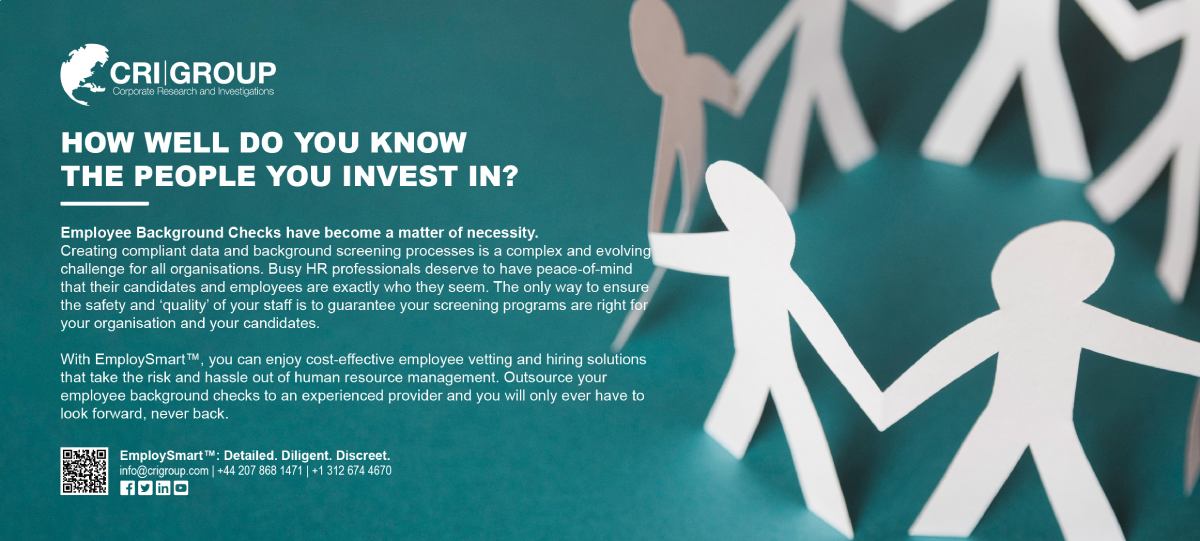


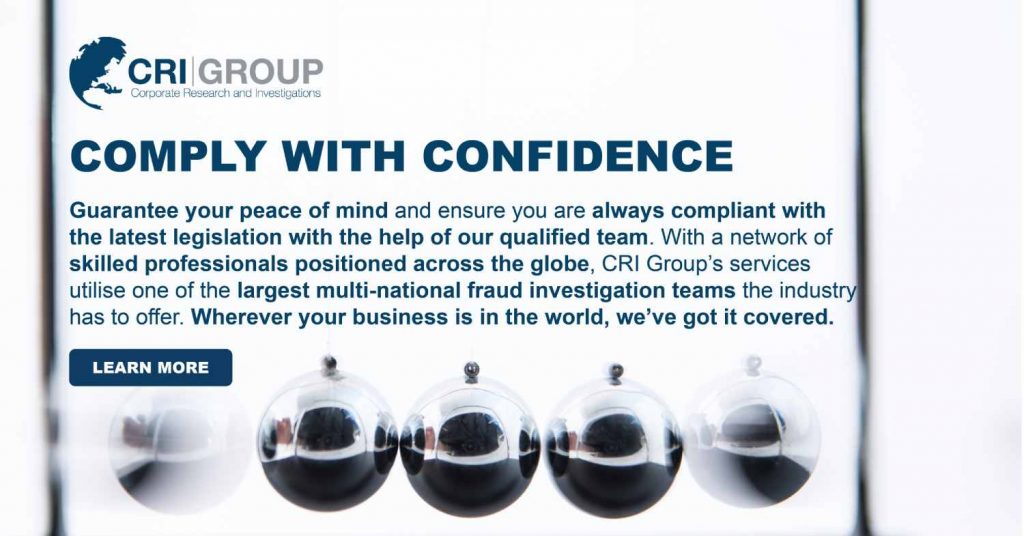
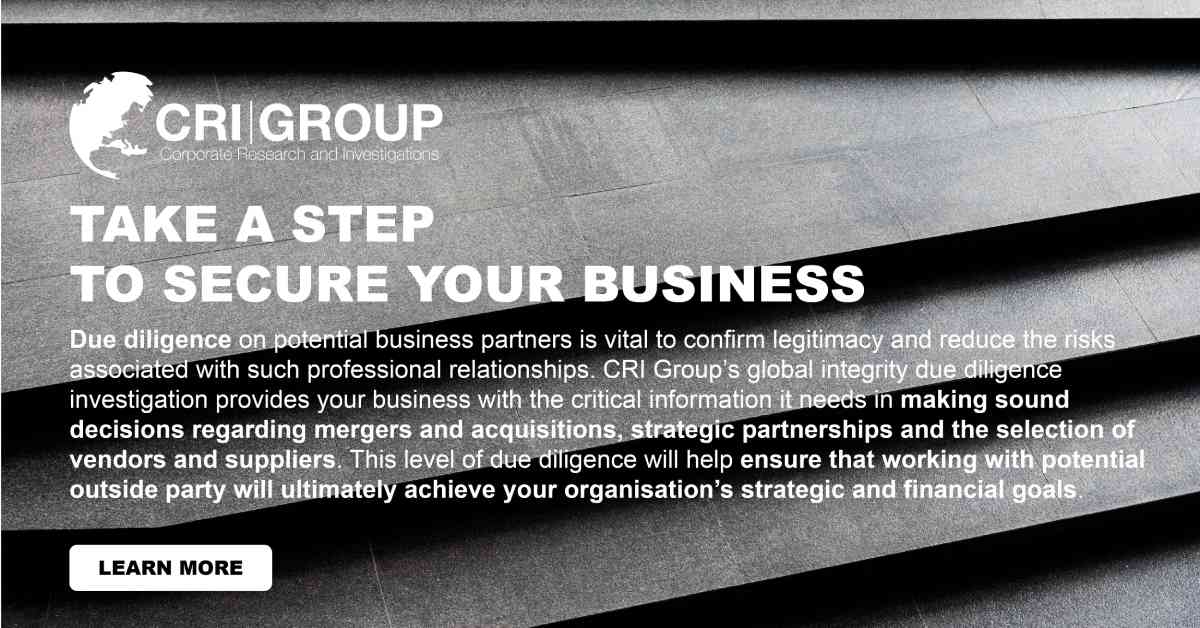

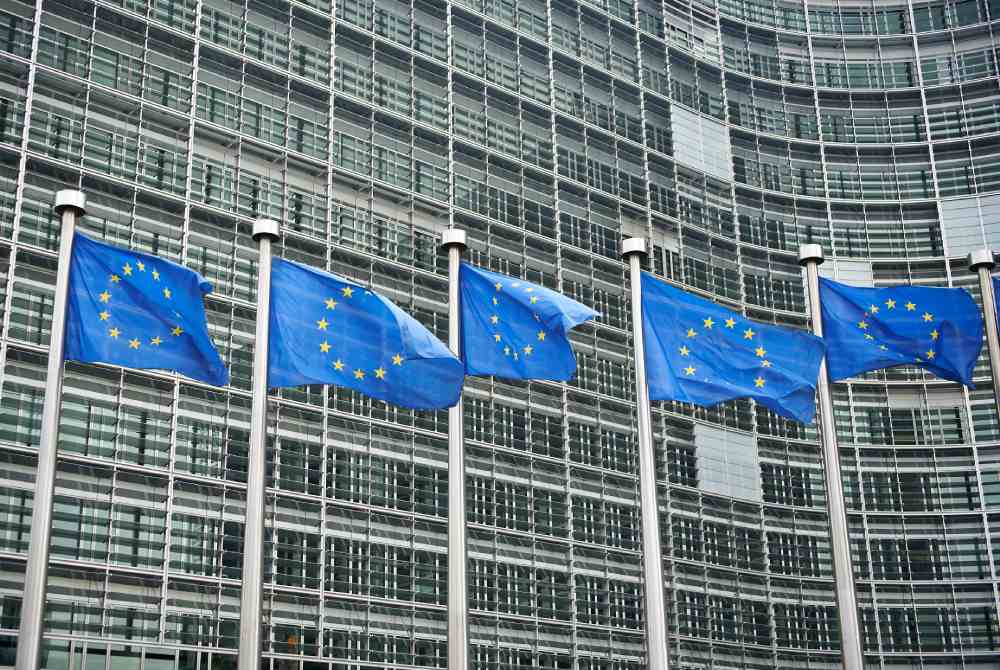
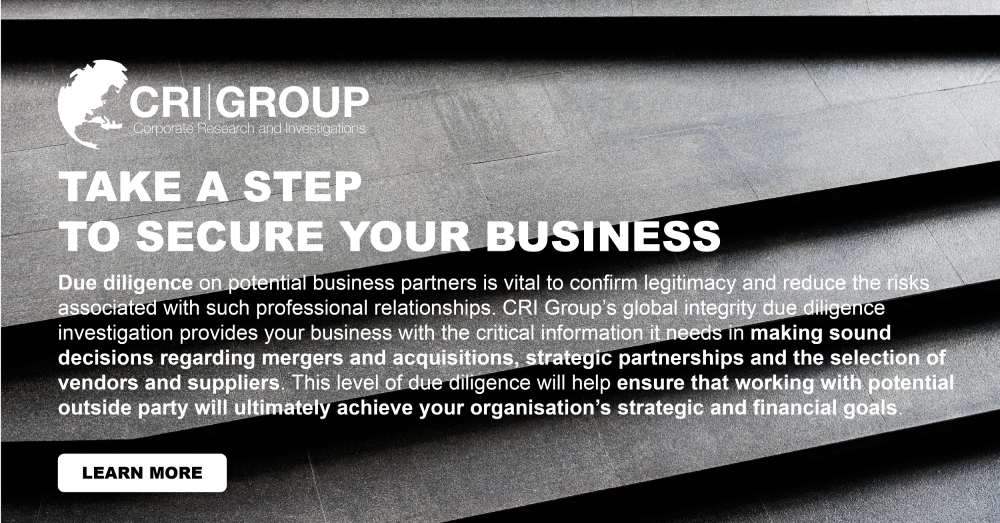
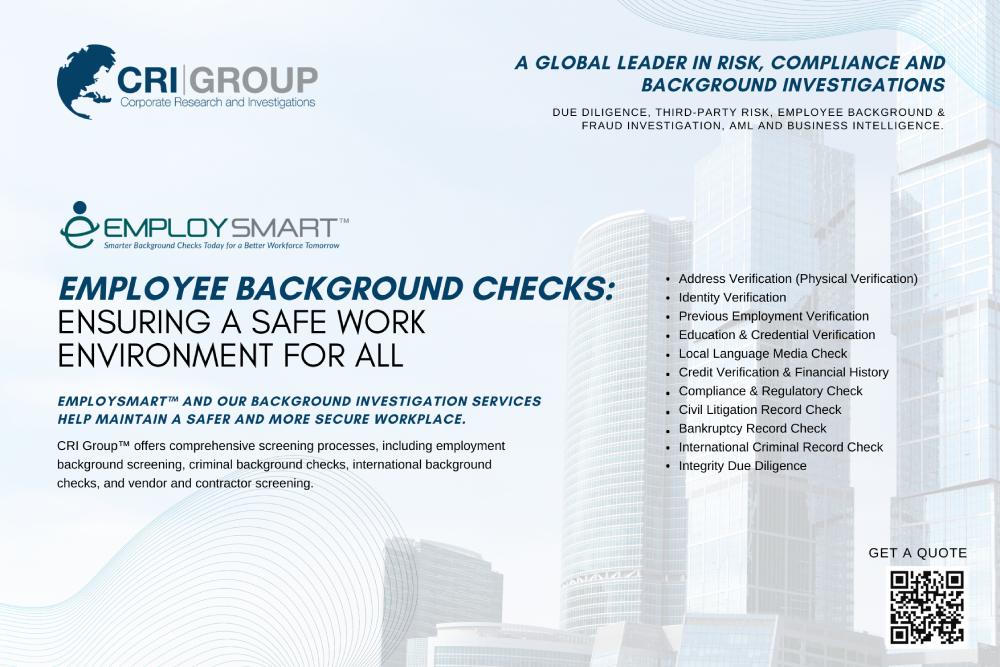
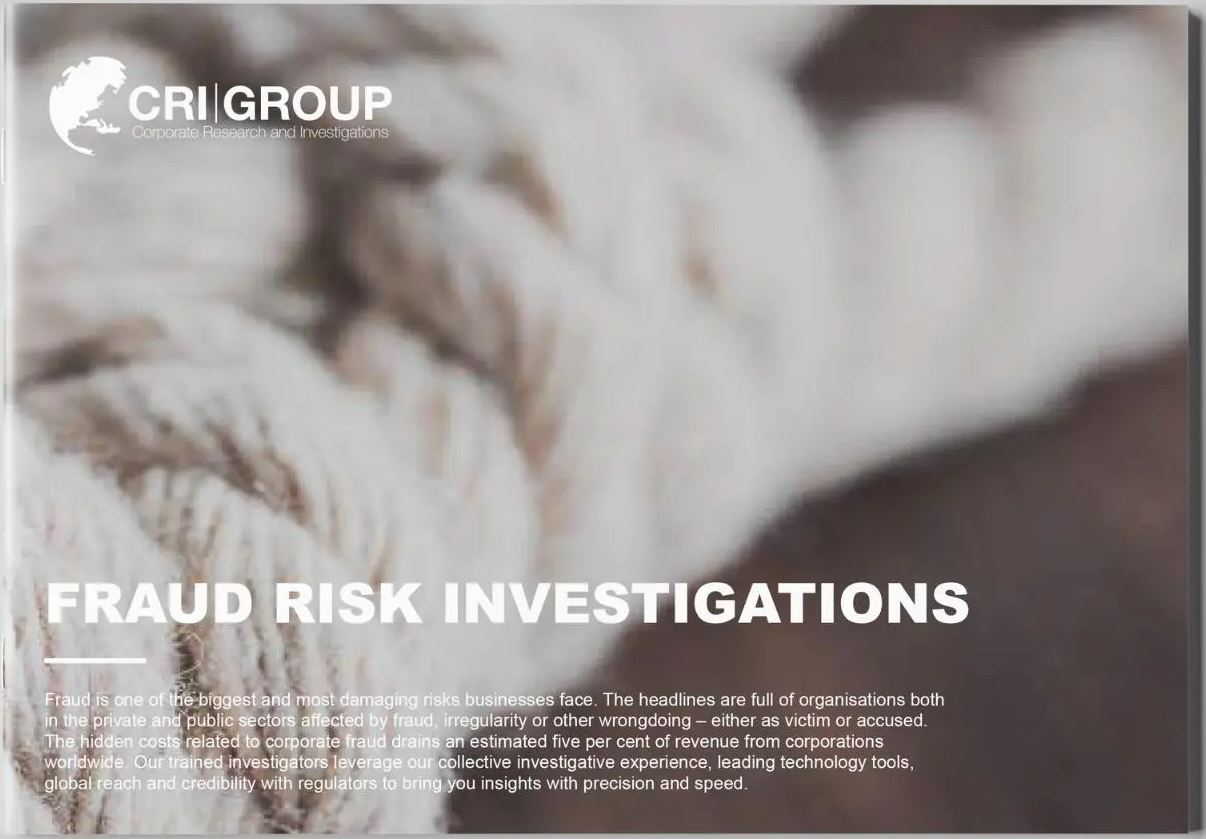
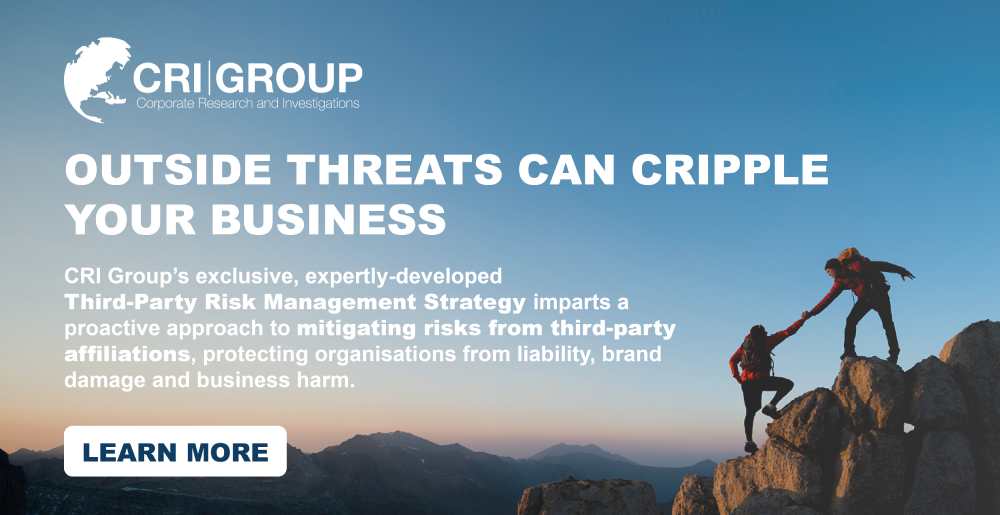
CONTACT US
Headquarter: +44 7588 454959
Local: +971 800 274552
Email: info@crigroup.com
Headquarter: 454959 7588 44
Local: 274552 800 971
Email: info@crigroup.com
NEWSLETTER SUBSCRIPTION